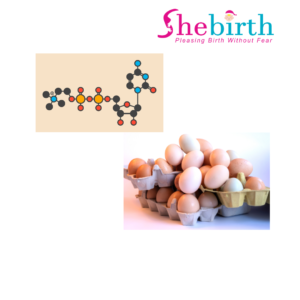Choline: An Amazing Nutrient for Brain Development

Choline is an important nutrient that plays a vital role in brain development and function. During pregnancy, adequate choline intake aids fetal brain development and helps prevent certain developmental disorders.
The Role of Choline in Pregnancy
Choline is involved in the production of acetylcholine, a neurotransmitter that supports brain function and memory. It also plays a role in the formation of cell membranes and DNA synthesis. Adequate choline intake during pregnancy is important for normal brain development and cognitive function in the baby.
Recommended Dosage
The recommended daily intake of choline for pregnant women is 450 milligrams (mg). This amount can be obtained through food and nutritional supplements.
Sources of Choline
Foods rich in choline include:
- Eggs: One of the best sources of choline.
- Meat: Chicken and beef contain high amounts of choline.
- Fish: Salmon and cod are good sources.
- Beans: Beans and peas also contain choline.
Supplementing Choline
Many prenatal vitamins do not contain choline, so a separate choline supplement may be needed to reach the recommended intake. Consult your doctor to determine the correct dosage and supplement for your needs.
Potential Side Effects
Choline is generally safe when taken in recommended amounts. High doses can cause symptoms such as a fishy aftertaste and gastrointestinal issues. Be sure to follow the recommended dosage and consult your doctor if any side effects occur.
Choline is an important nutrient for brain development and cognitive function. By ensuring adequate intake through diet and supplementation, you can support your baby’s brain development and promote a healthy pregnancy.
1. Why is choline important during pregnancy?
Choline is essential for fetal brain development and cognitive function. It supports the formation of cell membranes, DNA synthesis, and the production of acetylcholine, a neurotransmitter that is essential for memory and brain function.
2. How much choline should I take during pregnancy?
The recommended daily intake of choline for pregnant women is 450 milligrams (mg). This can be achieved through diet and, if necessary, supplementation.
3. What foods contain high amounts of choline?
Foods rich in choline include eggs, meats (such as chicken and beef), fish (such as salmon and cod), and legumes (such as beans and peas).
4. Am I getting enough choline from my prenatal vitamins?
Many prenatal vitamins do not contain choline, so a separate choline supplement may be necessary. Talk to your doctor to make sure you are meeting your daily choline needs.
5. What are the side effects of taking too much choline?
While choline is generally safe, consuming it in excess can lead to side effects such as a fishy aftertaste, sweating, and gastrointestinal issues. Be sure to follow the recommended dosage and talk to your doctor if any side effects occur.
6. Do I need a choline supplement if I eat a balanced diet?
If your diet includes choline-rich foods such as eggs and meat, you can meet your daily choline needs without supplementation. However, it is important to discuss your diet with your doctor to determine if supplementation is necessary.
7. Will a choline deficiency affect my baby?
Yes, insufficient choline intake during pregnancy can affect fetal brain development and increase the risk of certain developmental disorders. Getting enough choline is essential for your baby’s health.
8. When should I start taking choline during pregnancy?
It makes sense to ensure adequate choline intake as early as possible throughout pregnancy. Choline is essential at all stages of fetal brain development.
9. Are there any risks of taking choline during pregnancy?
Choline is safe to take in recommended amounts. The risks usually come from overdosage, which can cause mild side effects. Always contact your doctor for personal advice.
10. Can I get choline from plants?
Yes, plant sources of choline include legumes, such as beans and peas. However, choline is more abundant in animal products, so vegetarians and vegans may need to pay special attention to their intake or consider supplements.
